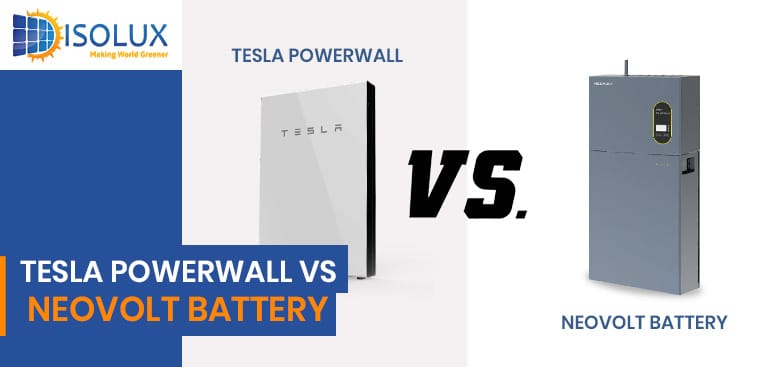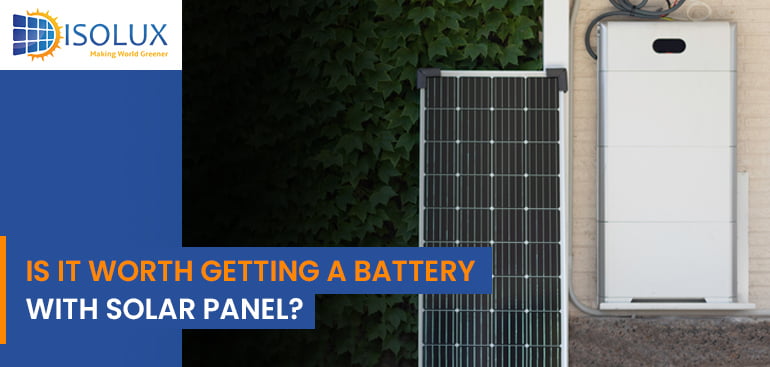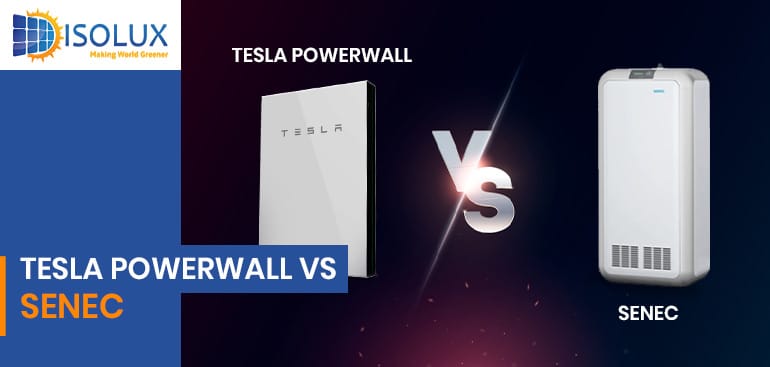As solar energy adoption grows in Sydney, homeowners are increasingly considering battery storage solutions to enhance energy independence and efficiency. Two prominent options in the market are the Tesla Powerwall and the Neovolt Battery. Let’s get into comprehensive comparison between Tesla Powerwall and Neovolt battery, their specifications, advantages, disadvantages, warranties, and costs to assist you in making an informed decision.
Comparison between Tesla Powerwall vs Neovolt Battery
| Feature | Tesla Powerwall | Neovolt Battery |
| Capacity Options | 13.5 kWh | 10 kWh |
| Continuous Output | 5 kW | 5 kW |
| Round-Trip Efficiency | 90% | Not specified |
| Depth of Discharge | 100% | Not specified |
| Warranty | 10 years (70% capacity retention) | 5-year product; 10-year performance (80% capacity retention) |
| Cost | ~$13,000 AUD (excluding installation) | Varies; considered mid-range |
| Scalability | Up to 10 units | Multiple capacity options available |
| Integrated Inverter | Yes | Yes |
| Customer Service | Some reports of responsiveness issues | Limited customer feedback available |
Tesla Powerwall Battery
Tesla Powerwall is a rechargeable lithium-ion battery system designed for residential energy storage. It stores electricity generated from solar panels or the grid, providing backup power during outages and enabling homeowners to manage energy usage effectively. The Tesla Powerwall 2, a widely adopted model in Australia, offers a usable capacity of 13.5 kilowatt-hours (kWh) and a continuous power output of 5 kilowatts (kW). It features an integrated inverter, facilitating seamless integration with existing solar systems. The system boasts a round-trip efficiency of 90% and operates within a temperature range of –20°C to 50°C, making it suitable for various Australian climates. Tesla provides a 10-year warranty for the Powerwall, ensuring long-term reliability for users.
Also read: Tesla Powerwall 3 vs 2
Specifications:
- Power Capacity: 13.5 kWh
- Continuous Power Output: 5 kW
- Round-Trip Efficiency: 90%
- Depth of Discharge (DoD): 100%
- Dimensions: 1150 mm x 755 mm x 155 mm
- Weight: 114 kg
- Chemistry: Lithium-ion
- Warranty: 10 years with unlimited cycles for solar self-consumption and backup use, guaranteeing 70% capacity retention at the end of the warranty period.
Advantages:
- High Efficiency: With a 90% round-trip efficiency, the Powerwall effectively stores and delivers energy.
- Full Depth of Discharge: The 100% DoD allows users to utilize the entire 13.5 kWh capacity.
- Scalability: Multiple units can be stacked to increase storage capacity for larger energy needs.
- Brand Reputation: Tesla’s established presence in the energy sector provides a sense of reliability and innovation.
Disadvantages:
- High Installation Costs: As of late 2023, a fully installed Powerwall in Australia costs approximately $14,250, which may be a significant investment for some homeowners.
- Customer Service Concerns: Some users have reported challenges with Tesla’s customer service responsiveness.
Warranty
Tesla offers a 10-year warranty, guaranteeing that the Powerwall will retain at least 70% of its capacity over this period.
Neovolt Battery
Neovolt Battery is a lithium-ion energy storage solution tailored for residential use. It offers various capacity options to suit different energy needs and is compatible with most popular inverter brands, enhancing its adaptability for diverse solar installations. The system achieves a round-trip efficiency of over 90% and has a lifespan of up to 8,000 cycles, indicating robust performance over time. Neovolt provides a warranty of up to 10 years, reflecting confidence in the product’s durability.
Specifications:
- Power Capacity Options: 5 kWh, 10 kWh, and 15 kWh models
- Cycle Life: Approximately 5,000 cycles at 80% capacity
- Charging Time: Designed with quick charging technology to reduce downtime
- Compatibility: Compatible with most popular inverter brands
- Chemistry: Lithium-ion
Advantages:
- Flexible Capacity Options: Offers various sizes to suit different household energy requirements.
- Efficient Power Output: Designed to optimize energy transfer, reducing waste and maximizing utility.
- Durability: Built with advanced lithium-ion technology, supporting a high number of charge cycles.
- Weather Resilience: Engineered to perform effectively under diverse Australian weather conditions.
Disadvantages:
- Higher Upfront Cost: While offering robust features, the initial investment may be higher compared to some alternatives.
- Limited Brand Recognition: Compared to Tesla, Neovolt may not have the same level of market presence or brand awareness.
Warranty
Bytewatt, the manufacturer of the Neovolt Battery, provides a 5-year product warranty and a 10-year performance warranty, ensuring at least 80% capacity retention over this period.
Checkout Neovolt Battery Review
Cost Comparison
- Tesla Powerwall: The total installed cost is approximately $14,250 in Australia.
- Neovolt Battery: Pricing varies depending on the model and installation requirements. Generally, it is considered a mid-range option with a good balance of performance and affordability.
Conclusion
Both the Tesla Powerwall and the Neovolt Battery offer viable solutions for homeowners in Sydney seeking energy storage systems. The Tesla Powerwall stands out with its high capacity, integrated inverter, and comprehensive warranty, making it suitable for those seeking a robust and scalable solution. On the other hand, the Neovolt Battery provides flexible capacity options and a potentially more affordable entry point, appealing to budget-conscious consumers. Homeowners should assess their specific energy needs, budget, and preferences when choosing between these two options.
Consult with Isolux Solar and get a free quote now.




